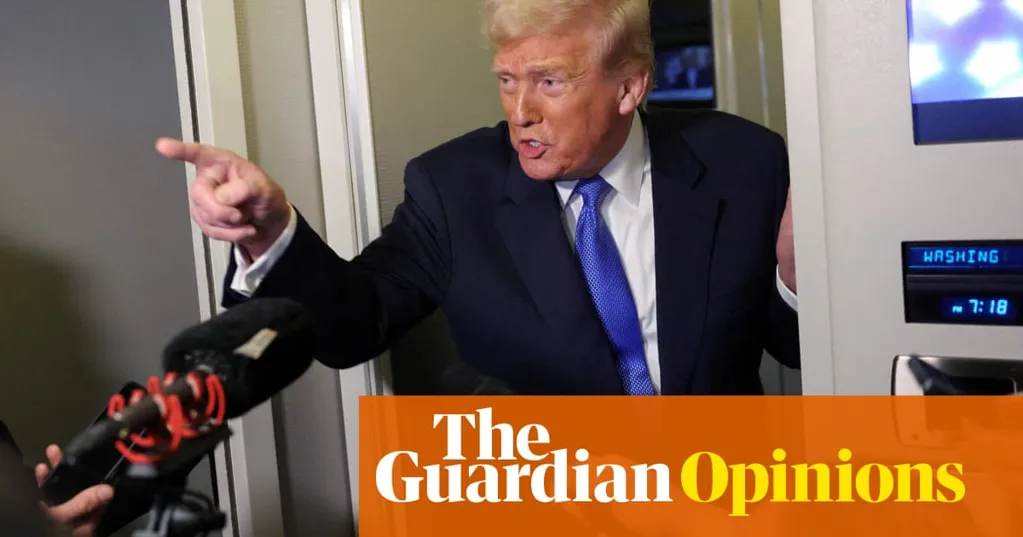The president has spent the past decade employing a familiar tactic. Accusing protesters of 'insurrection' is just the latest example.
Donald Trump and his allies wasted little time in branding the people protesting against immigration enforcement raids in Los Angeles as "insurrectionists". Stephen Miller, the White House deputy chief of staff for policy - particularly the vindictive kind - spoke darkly of a "violent insurrection". JD Vance, the vice-president, inveighed against "insurrectionists carrying foreign flags" on the streets of the nation's second-biggest city.
It didn't escape notice that an insurrection was exactly what the president was accused of instigating on 6 January 2021, when the flag being paraded through the Capitol was that of the Confederate secessionists. And that Trump hadn't shown quite the same enthusiasm for sending in the troops then.
But simply accusing the leader of the Maga movement of hypocrisy feels like such a 2015 move. It barely registers as news these days.
What's really notable is that this is the latest example of Trump's well-honed tactic of repurposing criticisms of himself to attack his enemies.
The world was first introduced to this manoeuvre on 19 October 2016 during a presidential debate in Las Vegas. When Hillary Clinton accused Trump of being Vladimir Putin's puppet, Trump shot back: "No puppet, no puppet ... No, you're the puppet."
To many it sounded infantile, more proof of Trump's lack of seriousness as a candidate. Back then, Twitter was the go-to platform to register reaction, as CBS reported:
"'NO, YOU'RE THE PUPPET!' A presidential candidate just went straight up preschool on his opponent," one person tweeted.
"'NO YOU'RE THE PUPPET' shows how truly childish our election system has become," someone replied.
True, but these reactions underestimated the power of this simple, some would say puerile, tactic. After all, this was a time when the term "fake news" was still used in its original sense of fringe media stories that were deliberately untrue before Trump restyled it into a catch-all term for the mainstream media and anything it produces that he doesn't like.
The fact that people are now less likely to associate "fake news" with Pizzagate than with Trump's attacks on the likes of CNN shows just how effective this switcheroo is.
But its real power lies in the way it undermines the very notion of truth. If everyone's an insurrectionist, no one is. As with Humpty Dumpty, words mean what Trump wants them to mean.
The more you look, the more you see the tactic everywhere. It's a pretty safe bet the phrase "election interference" had never tripped off Trump's tongue before 2016, when the question of Russia's role in helping secure his election ultimately led to the Mueller report. After he was charged with election interference following the 2020 vote, however, he accused, among others, the Biden administration, the Secret Service, Google, the British Labour party and Kamala Harris (on the - entirely false - grounds she had posted AI-created images of her rallies) of "election interference" in the 2024 contest.
When Democrats accused Trump of trying to "weaponize" the Department of Justice in his attempts to illicitly stay in office after his 2020 election defeat, it was only a question of time before "weaponization" would re-emerge, rotated 180 degrees, as a favourite term in the Maga lexicon of vitriol. Once Republicans regained control of the House of Representatives in 2023, it was they who set up a formal subcommittee on "weaponization" of the federal government, to castigate their enemies. And when the Trump 2.0 administration weaponized the federal government to fire justice department officials who had participated in Jack Smith's "election interference" case against Trump on the grounds that they had weaponized the government ... we had truly stepped through the looking glass.
Accusing anti-racist campaigners of racism? Check. Denouncing Jews as antisemites? Check.
And it's all helped by another apparently childish but startlingly effective tactic: repetition. Why did a majority of Republicans in 2024 believe that Biden's election victory four years earlier was rigged despite all evidence to the contrary? Probably because Trump spent fours years, day after day, saying it was. Why did so many Americans in the 2024 election campaign insist they had been better off four years earlier despite the demonstrable fact that Covid-hit 2020 had been an economic disaster? Well, maybe Trump's constant bragging about presiding over the "greatest economy in the history of the world" had more than a little method to it. (As the musician Mark E Smith said in another context: "It's not repetition; it's discipline." You can say that again.)
Trump's rhetorical tropes may display a certain reptilian genius but there is nothing new under the sun.
"The English follow the principle that when one lies, one should lie big, and stick to it. They keep up their lies even at the risk of looking ridiculous." So claimed a 1941 article called Churchill's Lie Factory written by one Joseph Goebbels who had been accused of ... exactly that.
